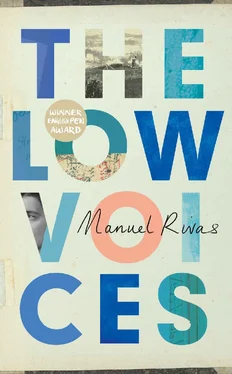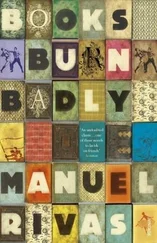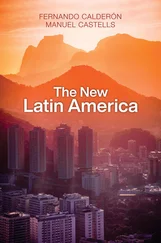Manuel Rivas - The Low Voices
Здесь есть возможность читать онлайн «Manuel Rivas - The Low Voices» весь текст электронной книги совершенно бесплатно (целиком полную версию без сокращений). В некоторых случаях можно слушать аудио, скачать через торрент в формате fb2 и присутствует краткое содержание. Год выпуска: 2016, Издательство: Harvill Secker, Жанр: Современная проза, на английском языке. Описание произведения, (предисловие) а так же отзывы посетителей доступны на портале библиотеки ЛибКат.
- Название:The Low Voices
- Автор:
- Издательство:Harvill Secker
- Жанр:
- Год:2016
- ISBN:нет данных
- Рейтинг книги:5 / 5. Голосов: 1
-
Избранное:Добавить в избранное
- Отзывы:
-
Ваша оценка:
- 100
- 1
- 2
- 3
- 4
- 5
The Low Voices: краткое содержание, описание и аннотация
Предлагаем к чтению аннотацию, описание, краткое содержание или предисловие (зависит от того, что написал сам автор книги «The Low Voices»). Если вы не нашли необходимую информацию о книге — напишите в комментариях, мы постараемся отыскать её.
A brilliant coming-of-age novel from one of Spain’s greatest storytellers,
is a humorous and philosophical take on memory, belonging, and the nature of storytelling itself.
The Low Voices — читать онлайн бесплатно полную книгу (весь текст) целиком
Ниже представлен текст книги, разбитый по страницам. Система сохранения места последней прочитанной страницы, позволяет с удобством читать онлайн бесплатно книгу «The Low Voices», без необходимости каждый раз заново искать на чём Вы остановились. Поставьте закладку, и сможете в любой момент перейти на страницу, на которой закончили чтение.
Интервал:
Закладка:
There were no books in our house. But we soon found out that the house was calling for them. One of the first things my father did when we moved to Castro was subscribe to a newspaper, in this case La Voz de Galicia . It was a wonderful period, when the newspaper was directed by Pedro de Llano Bocelo and then by Francisco Pillado. Bocelo was a popular character in a way that few journalists have been in A Coruña. My mother read him with enthusiasm because of his quest for solidarity with the underprivileged. In the hands of my parents, the newspaper really was ‘the working man’s book’. For my father, it constituted a whole ritual. He would read it very slowly and read it all. The only section he missed out was the section devoted to sport. He hated football so much he wouldn’t even shout ‘Long live Russia!’ when the Spanish national team was playing.
Often, on a Sunday morning, a young man with a book in his hand would climb the hill to O Escorial, in the direction of A Zapateira. We knew his name. This was Chao, Pai-Pai and Felisa’s son. He greeted us and carried on towards the unknown. But we children would fix our eyes on what he was carrying in his hand. On the paper creature. The secret.
One morning in winter, on the way to school, Domingos, who was a little older than me, informed me that Chao had been taken prisoner. Prisoner? What for? In a low voice, Domingos then said something that froze my insides: ‘One can’t say!’ How terrible must the crime have been if it couldn’t even be expressed in words! What could he have done, this amusing, entertaining young man who took books for walks in the mountains? It was back in 1964. In the newspaper, alongside others, appeared the photo provided by the Political — Social Brigade. Manuel Bermúdez, alias Chao, his face transformed, looking like a bandit. In fact, Chao, who’d been working since he was thirteen, first in a graphite factory and then as a glazier, had been involved in the anti-Fascist struggle since 1959. He was a nonconformist when it came to speech. Including the sentences that served to underline the slamming of cards in the tavern: ‘The flies will come and warn you!’, ‘Go and see if the cat has laid an egg!’ or more enigmatic stuff, such as the solemn ‘By the beard of Dostoyevsky!’ This spirit would explode during carnival, with its popular surrealism: ‘The Mass will be on the eighteenth of July if the deceased receive their bonuses. In saecula saeculorum , pig meat bacon is!’
One day, in the bar Os Beléns in Monelos, he came across Guillerme, who told him, ‘Don’t talk so loud! Keep your voice down. There are other things you can do.’ Guillerme had just arrived from France. He’d brought some clandestine newspapers, such as Mundo Obrero . Off they went, on the Guzzi, to deliver it around districts and villages in the shadows. For years, those young men on their motorbike managed to escape the eye that saw everything. Chao lived the experience with fear and emotion. There was a lot of indifference and distrust. But in the most unexpected, isolated places, there would be a hand in the night impatiently awaiting the secret pages.

Carnival in Castro de Elviña
In A Coruña Prison, a group of political prisoners organised a kind of free school, open to ordinary inmates. One day, Chao read a newspaper cutting that said, ‘The dangerous offender against private property Suso the Scorpion has been arrested.’ The following day, the Scorpion entered prison. Those who knew him welcomed the recidivist: ‘The Scorpion’s back, the Scorpion’s back!’ He enrolled in the makeshift school. He was really quite innocent by nature. Chao asked him, ‘What are you here for, Suso?’ And he explained, ‘This time, for stealing manure.’ Chao found the metaphor difficult to believe: the dangerous offender was in prison for having stolen a cart of manure. The Scorpion added, ‘But I didn’t tell the police I had stashed away some treasure.’ The Scorpion was a likeable character. The theft of manure didn’t go to court, however, and the order came to set him free. They threw him out, so to speak. The treasure man cried when taking his leave of the clandestine school, ‘I have such a good time here. You have tobacco and everything!’ In prison, Chao also came into contact with some tricksters who had swindled Hispano Americano Bank out of a fortune. They were Argentinian, elegant in appearance; they looked like dandies. Their food in prison was brought to them from an expensive restaurant that served platefuls of seafood. They would discuss the injustices of the economic system. While tucking into goose barnacles, the virtuoso swindlers would rebuff Chao — who was trying to explain the alliance between the forces of work and culture — by saying, ‘You really are a bunch of idiots! Where’s the money? In the banks! Go after it!! That’s the way to fight capitalism!’
When he came out of prison, we saw Chao again on a Sunday, on his way to the mountains, with a book in his hand. It didn’t take María and me long to set out after him. The title of the book was Long Night of Stone by Celso Emilio Ferreiro. That day, thanks to the youthful glazier, we were able to see wounded words emerging from under the stones. When a state of emergency was declared or there was a strike or the regime was sharpening its claws, Chao would disappear. He’d already said he wasn’t going to lounge around in bed, waiting to be arrested again. María and I used to visit a cave, an old mud pit. We’d go with a bucket to fetch clay so María could make some figures. If you didn’t know it was there, it was difficult to find. The entrance to the cave was narrow and obscured by bracken. It was nice being inside. Seeing the mouth of light, feeling its glow inside the earth. A warm, damp chamber with the welcoming, ancestral smell of mud. One day, we came across a checkered blanket folded up in a corner. On top of it was a book, one of those books that still talk, half read: The Brothers Karamazov . So this was the room of humanity, the cave we could perhaps return to one day as a refuge.
We never told anyone about it. Not even our mother, who would have sent us back with milk and bread for the mysterious tramp. Not even Chao. By the beard of Dostoyevsky!
19. Heraclitus, Parmenides and the Co-ed Institute
WE WERE STANDING up on the worn velvet seats of the old Monelos Cinema. Dancing wildly to ‘Los chicos con las chicas’. Los Bravos made a film from that song that was such a hit at the end of the 1960s. But we had a special reason for shouting out the elementary refrain: ‘Boys and girls have to be together!’ The institute in Monelos was the first co-ed institution in the whole of Galicia. It was located in a border area, where new blocks of social housing met fields of maize. A revolution. A frenzy. Sometimes, groups of pupils from private, religious schools would come to witness the spectacle. Boys and girls leaving class together. Bell-bottoms, the first miniskirts. But, above all, the excitement of being together. Suddenly establishing a connection with a look while the teacher Caeiro explains an essential debate that permeates the whole of history. Either you’re Parmenides. Everything remains. Or you’re Heraclitus. Everything flows: you never bathe in the same river twice.
Heraclitus was right, said Caeiro, but Parmenides wasn’t wrong.
The river, girl. Bathe together, girl. Remain, flow. It’s all in the classics.
I ran. I always had a strong wish to attend that school. In my feet and in my head. I would go across country as far as Elviña. Cross the Avenue like a Viet Cong. Officially named Alfonso Molina, back then it was called ‘the Ho Chi Minh route’. Lots of people got run over there until they finally built a footbridge. One of those who died was Manuel of Corpo Santo, my grandfather the scribe. This keen walker wasn’t killed in the war, but ended up being knocked over by a car on the Avenue. A poacher. The driver made off. And Manuel was stranded in the ditch, at the hour that separates the dog from the wolf. I ran in order to cross that mined frontier every day. I then followed a path that bordered the railway, next to a sea of rye. Until I reached the ‘district of flowers’, an area with blocks of social housing that were worthy of the name. There was an architectonic imagination that had envisaged something different and lacked the prison-like appearance of other new estates. This co-ed institute wasn’t just an exotic destination for peeping Toms. It was also a centre of attraction for juvenile gangs, the most famous being the Red Devils. They would go there more in search of fun than action. They would sometimes turn up with a portable record player, and the playground would transform into a party. In a way, they belonged to the institute. They should have been pupils, but they weren’t, even though there were some who were both ‘within and without’. I was struck by the hierarchy that existed in these groups. Their leadership wasn’t just a question of strength. One of the bosses was the Chinaman, who was short and light as a fly, but had the most intimidating eyes. So you had to try not to look at him, because, if you did, you soon felt the blade of his tongue scraping the back of your neck: ‘Hey, you, what you looking at?’ With the support of the group, he dominated by means of his cruelty. He carried a set of screwdrivers in the pocket of his sheepskin jacket. There was another kind of leader whose charisma came from the enchantment aroused by dangerous beauty. This was the case with Miguel the Palavean. His appearance always took the form of a ghostly apparition. Thin, olive skin, jet-black hair, full of laughter, aware of his charm, he provoked immediate uproar, in which there was a mixture of expectation and caution. It was him, really, it was him! But it seems true that the gods punish the chosen. Life would be hard on those who were hard. A mirror full of scars.
Читать дальшеИнтервал:
Закладка:
Похожие книги на «The Low Voices»
Представляем Вашему вниманию похожие книги на «The Low Voices» списком для выбора. Мы отобрали схожую по названию и смыслу литературу в надежде предоставить читателям больше вариантов отыскать новые, интересные, ещё непрочитанные произведения.
Обсуждение, отзывы о книге «The Low Voices» и просто собственные мнения читателей. Оставьте ваши комментарии, напишите, что Вы думаете о произведении, его смысле или главных героях. Укажите что конкретно понравилось, а что нет, и почему Вы так считаете.












